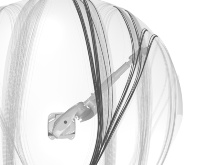Strategies for cyber-physical robotic fabrication and construction in architecture
Interconnected devices, online robotic control, and sensor feedback can enable the development of cyber-physical systems within robotic production processes for architecture and construction. Within the context of architecture and construction, cyber-physical systems present enormous potentials, enabling a reconsideration of typical fragmentation and compartmentalization through increased possibilities for integration and collaboration and a reexamination of the role of standardization, representation, and simulation within stereotypical design and production processes.
The capacity of cyber-physical systems to connect the actions of multiple machines, tools, and robots opens up new possibilities for architectural realization. The possibilities considered in this doctoral research fall into four interdependent categories:
(i) Flexible, semi-autonomous, and adaptive robotic processes;
(ii) Processes that involve indeterminate materials, incalculable, or non-standardized fabrication processes;
(iii) Collaborative or interactive fabrication processes which connect multiple entities and human operators towards the execution of common goals;
(iv) Increased integration, decision making at run-time, and diagnostics enabled by global monitoring and data processing.
A set of methods for implementing a cyber-physical fabrication workflow are presented. These methods include computational techniques for circumnavigating robotic constraints both before and during production. Several extendable network architectures are presented for online control and networked communication, and their application scenarios are discussed. Computational strategies and algorithms for integrating sensor feedback during a fabrication or production process are presented and discussed.
The potentials identified and techniques presented are investigated through large-scale physical demonstrators: either single robotic processes augmented with sensor feedback or multi-robot fabrication and construction processes in which networked communication systems connect robots, machines, users, and devices to work collaboratively towards common fabrication or construction goals. Critically, these case studies faced challenges that would have made them difficult or impossible to implement in the context of a highly linear and compartmentalized production workflow without feedback, sensor integration, or adaptation. The findings summarize design guidelines and strategies for cyber-physical robotic construction processes.
A critical conclusion of the work is that technical methodologies are insufficient in enabling the true potentials of cyber-physical construction. Additional developments would enhance the impact of cyber-physical systems in AEC, including domain-specific hardware and software tools developed for the needs and constraints of construction. Integrated co-design processes could enable new material systems and their requisite automation systems to be co-developed.
ICD Institute for Computational Design - Prof. Achim Menges
Scientific Development
Lauren Vasey
Funding
State Postgraduate Scholarship Programme Baden Württemberg
Related Publications
Vasey, L. Baharlou, E., Dörstelmann, M. Koslowski, V. Prado. M, Schieber, S. Menges, A. Knippers J. "Behavioral design and adaptive robotic fabrication of a fiber composite compression shell with pneumatic formwork." Computational Ecologies: Design in the Anthropocene: Acadia Conference Proceedings, 2015
Vasey, L., Nguyen, N., Grossman, T., Kerrick, H., Nagy, D., Atherton, E., Thomasson, D., Cote, N., Benjamin, D., Fitzmaurice, G., Menges, A. "Collaborative Construction: Human and Robotic Collaboration Enabling the Fabrication and Assembly of a Filament-Wound Structure." ACADIA // 2016: POSTHUMAN FRONTIERS: Data, Designers, and Cognitive Machines [Proceedings of the 36th Annual Conference of the Association for Computer Aided Design in Architecture, 2016
Related Research Buildings / Prototypes
Contact Information

Lauren Vasey
M.Arch. (Dist.), B.S.Eng (Hons.), Dr.-Ing.Research Associate


